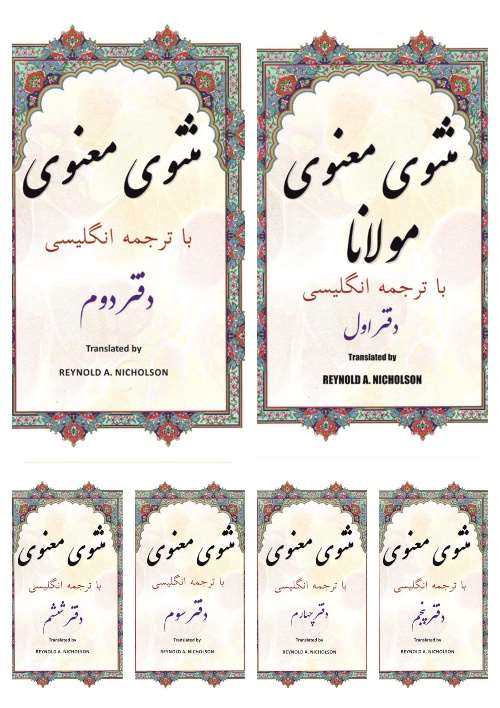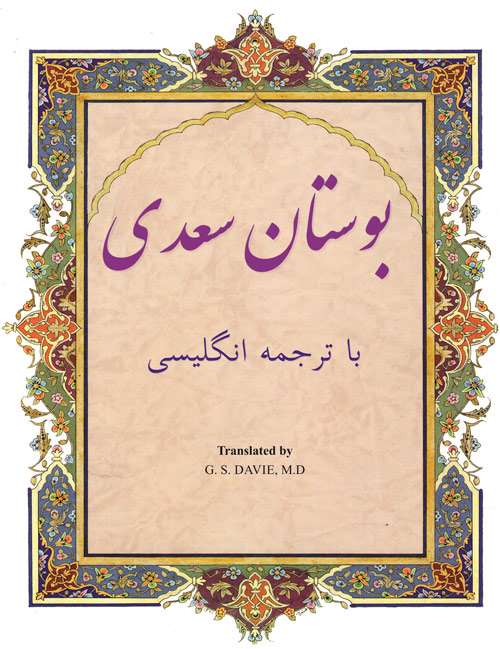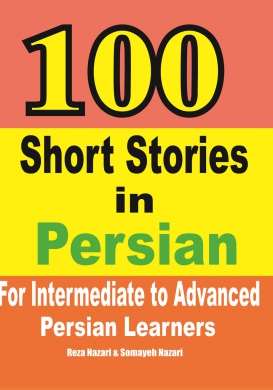
How the King was about to kill the Amírs, and how Ayáz made intercession before the royal throne, saying, “‘Tis better to forgive.” قصد شاه به کشتن امرا و شفاعت کردن ایاز پیش تخت سلطان کی ای شاه عالم العفو اولی
پس ایاز مهرافزا بر جهید پیش تخت آن الغ سلطان دوید
Then Ayáz, who was abounding in love, sprang up and ran to the throne of that mighty Sultan.
سجدهای کرد و گلوی خود گرفت کای قبادی کز تو چرخ آرد شگفت
He made a prostration and spoke with bated breath’, saying, “O Emperor at whom the celestial sphere is astounded,
ای همایی که همایان فرخی از تو دارند و سخاوت هر سخی
O Humá from whom (all) humá’s have (their) auspiciousness, and every generous man (his) generosity,
ای کریمی که کرمهای جهان محو گردد پیش ایثارت نهان
O Noble One before whose self-sacrifice (all) acts of nobility in the world are hidden (eclipsed) and disappear,
ای لطیفی که گل سرخت بدید از خجالت پیرهن را بر درید
O Lovely One whom the red rose beheld and tore its shirt in shame,
از غفوری تو غفران چشمسیر روبهان بر شیر از عفو تو چیر
Forgiveness (itself) is fully content with thy forgivingness: because of thy pardon the foxes prevail over the lion.
جز که عفو تو کرا دارد سند هر که با امر تو بیباکی کند
Whosoever treats thy command with insolence, whom should he have to support him except thy pardon?
غفلت و گستاخی این مجرمان از وفور عفو تست ای عفولان
The heedlessness and irreverence of these sinners arise from the abundance of thy pardon (clemency), O mine of pardon.”
دایما غفلت ز گستاخی دمد که برد تعظیم از دیده رمد
Heedlessness always grows up from irreverence, for (only) reverence will remove the inflammation from the eye .
غفلت و نسیان بد آموخته ز آتش تعظیم گردد سوخته
The heedlessness and wicked forgetfulness (which) he (the sinner) has learned will be consumed by the fire of reverence.
هیبتش بیداری و فطنت دهد سهو نسیان از دلش بیرون جهد
Awe (of God) will bestow on him wakefulness and keen wittedness: negligence and forgetfulness will leap forth from his heart.
وقت غارت خواب ناید خلق را تا بنرباید کسی زو دلق را
Folk do not fall asleep at the time of a raid, lest any one should carry off his (the sleeper’s) cloak.
خواب چون در میرمد از بیم دلق خواب نسیان کی بود با بیم حلق
Since sleep is banished by fear for one’s cloak, how should the sleep of forgetfulness be (possible when accompanied) with fear for one’s throat?’
لاتاخذ ان نسینا شد گواه که بود نسیان بوجهی هم گناه
(The text) do not punish (us) if we forget is evidence that forgetfulness too, in a certain way, is sinful,
زانک استکمال تعظیم او نکرد ورنه نسیان در نیاوردی نبرد
Because he (who was forgetful) did not attain to complete reverence, or else forgetfulness would not have assailed him
گرچه نسیان لابد و ناچار بود در سبب ورزیدن او مختار بود
Although (his) forgetfulness was necessary and inevitable, (yet) he was a free agent in employing the means (by which it was produced);
که تهاون کرد در تعظیمها تا که نسیان زاد یا سهو و خطا
For he showed remissness in his feelings of reverence, so that I forgetfulness was born or negligence and trespass.
همچو مستی کو جنایتها کند گوید او معذور بودم من ز خود
(‘Tis) like (the case of) the drunken man who commits sins and says, “I was excused from (responsibility for) myself”
گویدش لیکن سبب ای زشتکار از تو بد در رفتن آن اختیار
“But,” says he (the other) to him, “the cause (of your sin), (consisting) in the loss of that power to choose, proceeded from you, O evil-doer.
بیخودی نامد بخود تش خواندی اختیارت خود نشد تش راندی
Your senselessness did not come of itself, you invited it; your power to choose did not go of itself, you drove it away.
گر رسیدی مستی بیجهد تو حفظ کردی ساقی جان عهد تو
If an intoxication had come (upon you) without exertion on your part, the spiritual Cup-bearer would have kept your covenant (inviolate).
پشتدارت بودی او و عذرخواه من غلام زلت مست اله
He would have been your backer and intercessor: I am devoted to the sin of him who is intoxicated by God.”
عفوهای جمله عالم ذرهای عکس عفوت ای ز تو هر بهرهای
(Ayáz said), “The forgivenesses of the whole world are (but) a mote the reflexion of thy forgiveness, O thou from whom comes, every fortune.
عفوها گفته ثنای عفو تو نیست کفوش ایها الناس اتقوا
(All) forgivenesses sing the praise of thy forgiveness: there is no peer to it. O people, beware (of comparing it)!
جانشان بخش و ز خودشان هم مران کام شیرین تو اند ای کامران
Grant them their lives, neither banish them from thyself: they are (the objects of) thy sweet desire, O thou who bringest (all thy) desire to fruition.
رحم کن بر وی که روی تو بدید فرقت تلخ تو چون خواهد کشید
Have mercy on him that beheld thy face: how shall he endure I the bitter separation from thee?
از فراق و هجر میگویی سخن هر چه خواهی کن ولیکن این مکن
Thou art speaking of separation and banishment: do what I thou wilt but do not this.
صد هزاران مرگ تلخ شصت تو نیست مانند فراق روی تو
A hundred thousand bitter sixtyfold deaths are not like (comparable) to separation from thy face.
تلخی هجر از ذکور و از اناث دور دار ای مجرمان را مستغاث
Keep the bitterness of banishment aloof from males and females, O thou whose help is besought by sinners!
بر امید وصل تو مردن خوشست تلخی هجر تو فوق آتشست
Tis sweet to die in hope of union with thee; the bitterness of banishment from thee is worse than fire.”
گبر میگوید میان آن سقر چه غمم بودی گرم کردی نظر
Amidst Hell-fire the infidel is saying, “What pain should I feel if He (God) were to look on me (with favour)?”
کان نظر شیرین کنندهی رنجهاست ساحران را خونبهای دست و پاست
For that look makes (all) pains sweet: it is the blood-price (paid) to the magicians (of Pharaoh) for (the amputation of) their hands and feet.
Special Offers
by: Reza about (category: Masnavi, Persian Poetry)
















What people say about "How the King was about to kill the Amírs"?
No one replied yet.